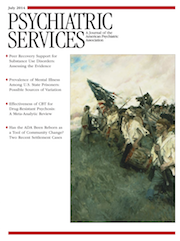Identifying Depression in a National Sample of Caregivers Investigated in Regard to Their Child’s Welfare
Abstract
Objectives
Identifying depression is the first step in provision of treatment across service settings but can be challenging for non–mental health providers. This study examined how caseworker identification of depression among parents and other caregivers during the child welfare investigation or assessment process varies as a function of agency, caseworker, and case characteristics.
Methods
Data were drawn from the second National Survey of Child and Adolescent Well-Being (NSCAW II), a national probability sample of children referred to U.S. child welfare agencies between February 2008 and April 2009. The study sample comprised 889 parents and other caregivers whose children initially remained at home and whose confidential responses on the World Health Organization Composite International Diagnostic Interview Short Form indicated a major depressive episode within the past 12 months. Weighted logistic regression examined predictors of caseworker identification of caregiver depression at the agency, caseworker, and case levels.
Results
Investigative caseworkers identified mental health needs of only 38% of caregivers. Caseworkers were more likely to identify caregiver mental health needs when child welfare agency policy specified use of a standardized mental health assessment and when the maltreatment report came from a health or mental health provider versus other sources, such as teachers or family members. Investigative caseloads were negatively associated with identifying depression.
Conclusions
Structured mental health assessments may help non–mental health professionals identify mental health needs among vulnerable populations.



